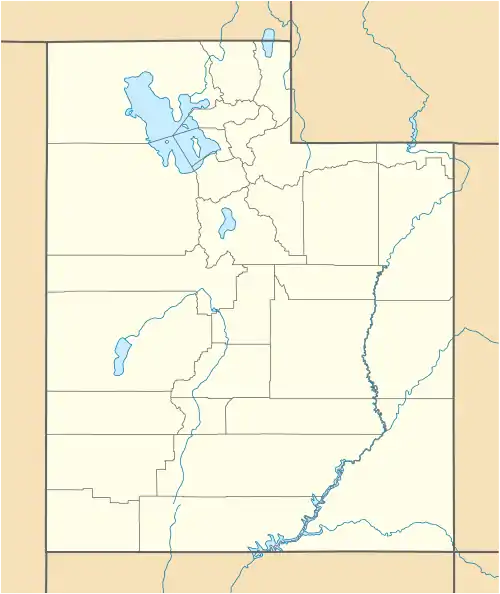Hurricane Canal | |
 | |
  | |
| Nearest city | Hurricane, Utah |
|---|---|
| Coordinates | 37°11′04.45″N 113°16′40.7″W / 37.1845694°N 113.277972°W |
| Area | 12.6 acres (5.1 ha) |
| Built | 1904Jo |
| Architect | Multiple |
| NRHP reference No. | 77001324[1] |
| Added to NRHP | August 29, 1977 |
The Hurricane Canal[2] is a hand-excavated irrigation canal that diverted water from the Virgin River to the east side of Hurricane, Utah, United States.
Description
The 7.5-mile (12.1 km) canal was built starting in 1891 and completed in 1904. The work included a diversion dam on the Virgin River, the 12-foot (3.7 m) wide canal grade with an 8-foot (2.4 m) wide by 4-foot (1.2 m) deep channel, and a series of flumes and trestles. Work was done by local men, mainly between November and May. The work was paid for by the canal's shareholders, whose lands on the Hurricane Bench were to be irrigated by the canal. Allotments were limited to 20 acres (8.1 ha) for shareholder. The 2,000 acres (810 ha) of new agricultural lands allowed the settlement of Hurricane after 1906.[3]
._-_Hurricane_Irrigation_Canal%252C_State_Route_15_Vicinity%252C_Hurricane%252C_Washington_County%252C_UT_HAER_UTAH%252C27-HURI%252C1-13.tif.jpg.webp)
The work and the shareholder system were organized by James Jepson, Jr. and John Steele.[4] The superintendent of construction was J.T. Willis. Work was hampered by the failure of the first two diversion dams at the Narrows section of the Virgin River. The final dam was a timber crib and boulder structure, later augmented with concrete. From the dam the canal runs westerly 3.5 miles (5.6 km) along the wall of the Virgin River Canyon, then south for 3 miles (4.8 km) along the Hurricane Cliffs to the Hurricane Bench. It passes through twelve tunnels and six flumes. Wood flumes have been replaced with metal, and ten cisterns for drinking water have been abandoned.[3]
The Hurricane Canal was listed on the National Register of Historic Places on August 26, 1977.[1] The canal no longer carries water. A trail now runs along the dry canal.[5] Eleven of the twelve tunnels remain accessible to hikers.[6]
See also
References
- 1 2 "National Register Information System". National Register of Historic Places. National Park Service. July 9, 2010.
- ↑ U.S. Geological Survey Geographic Names Information System: Hurricane Canal
- 1 2 Powell, A. Kent (14 Jan 1977). "National Register of Historic Places Inventory - Nomination Form: Hurricane Canal". nps.gov. National Park Service. Retrieved 27 Mar 2014.
- ↑ "James Jepson Jr. Home in Virgin Utah". Washington County Historical Society County History Database. Retrieved 11 September 2022.
- ↑ "Area History and Attractions". cityofhurricane.com. Hurricane City. Retrieved 27 Mar 2014.
- ↑ "Canal Trail". Bureau of Land Management. Archived from the original on 5 April 2015. Retrieved 27 Mar 2014.
External links
- Hurricane Canal at the Washington County Historical Society
- Canal Trail, Bureau of Land Management
- Historic American Engineering Record (HAER) No. UT-17, "Hurricane Irrigation Canal, State Route 15 Vicinity, Hurricane, Washington County, UT", 19 photos, 3 measured drawings, 11 data pages, 2 photo caption pages